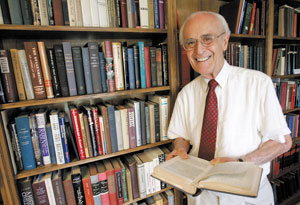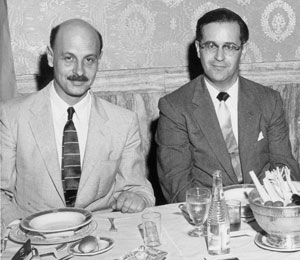 Rabbi Morris B. Margolies, who served the community as Congregation Beth Shalom’s senior rabbi for 25 years, passed away Friday evening, Nov. 9. About 600 people filled the Kehilath Israel Synagogue sanctuary on Monday to honor his life. He would have been 91 on Dec. 25.
Rabbi Morris B. Margolies, who served the community as Congregation Beth Shalom’s senior rabbi for 25 years, passed away Friday evening, Nov. 9. About 600 people filled the Kehilath Israel Synagogue sanctuary on Monday to honor his life. He would have been 91 on Dec. 25.
More than one of the afternoon’s speakers — which included K.I. Senior Rabbi Shmuly Yanklowitz, K.I. Rabbi Emeritus Herbert Mandl, Beth Shalom Senior Rabbi David Glickman and Professor Zvi Gitelman, Rabbi Margolies’ nephew — referred to Rabbi Margolies as “larger than life.” Hazzan Jeffrey Shron also participated in the service.
“He was a bigger than life rabbi who believed in social justice driven Judaism,” said Rabbi Yanklowitz as he began the eulogy.
Rabbi Margolies served Beth Shalom from 1961 to 1986. During that time the Conservative synagogue’s membership grew to 1,400 congregants.
Born in Jerusalem, Rabbi Margolies came to the United States in 1930 at the age of 8. He was ordained at Yeshiva University in 1943, where he also earned a Bachelor of Arts degree. He completed his Master of Arts degree from the University of Chicago in 1946 and his doctorate in Jewish history from Columbia University in 1979.
Before coming to Kansas City, Rabbi Margolies had pulpits in Chicago, Denver and Brooklyn, N.Y. He also served two years as executive director of the American Jewish Congress, Midwest Division.
Rabbi Margolies proudly served in the Army Chaplaincy — first at Fort Bragg, N.C., and then in Korea. A man morally opposed to war, Rabbi Yanklowitz said Rabbi Margolies went to Korea only after being told “Jewish soldiers needed him.”
Serving Beth Shalom
According to “Mid America’s Promise: A Profile of Kansas City Jewry (edited by Joseph P. Schultz, 1982) Rabbi Margolies told his new congregation in his opening sermon that he would be controversial, but not deliberately so. One of his first controversial stances in Kansas City was opposing the Vietnam War. In fact he was one of the first pulpit rabbis in the country to do so.
Rabbi Margolies always stressed social activism and urged his congregants to become involved in human rights and Jewish education. He practiced what he preached by, among other things, supporting the Civil Rights Movement and promoting equality for women in the Conservative movement.
“He was a champion for women’s representation at Beth Shalom,” Rabbi Glickman noted. “He ushered in full female participation before much of the country and he personally saw to the adult Bat Mitzvah program … dozens of adult women who never in their lifetime had had the chance to lead from the Torah or to lead services.”
In “Mid-America’s Promise,” Dr. Schultz writes that Rabbi Margolies “brought impressive intellectual qualities and fine oratorical gifts to the pulpit of Beth Shalom …. Margolies accelerated the adult education program, and his weekly evening lectures attracted large numbers of members and non-members to the synagogue. His weekly morning classes for the Sisterhood and his Men’s Club study group held over lunch in a downtown restaurant were immediately and lastingly successful.”
The rabbi felt teaching was one of his life’s missions.
“I see myself as a teacher of Jewishness and Judaism …,” he told former Chronicle Editor Rick Hellman is his last interview, featured in The Chronicles Guide to Jewish Life in the spring of 2008.
“When I got through organizing regular study periods for the Sisterhood and the regular congregation, we had as many as 600 or 700 people attend lectures I gave, a good many of them gentiles,” said the rabbi.
Day school champion
From the time he first moved to Kansas City, Rabbi Margolies fought for a Jewish day school. He believed it would help ensure the survival of the Kansas City Jewish community. He told The Chronicle that “no Jewish community can survive persistent ignorance of its own tradition and culture.”
He never served in an official capacity with the day school, but is often credited with working tirelessly to get it established. He enrolled his daughter, Malka, to be part of its inaugural class in 1966. His support of a Jewish day school was another of the rabbi’s highly controversial views.
“The rabbi was actually warned by his board not to have anything to do with the creation of a day school,” said Blanche Sosland, a founder of the Jewish day school. “In spite of that Rabbi Margolies was one of the major players, albeit behind the scenes. His guidance and advice to the young leadership was really indispensible.”
Once the Hebrew Academy was established, there was still the matter of community funding. But the school didn’t receive any financial subsidy from the Jewish Federation of Greater Kansas City until 11 years after it opened. Rabbi Margolies served on a committee whose purpose was to recommend whether the Federation should subsidize it. There were an even number of pro and con voices on the committee and Rabbi Margolies recalled that, “It looked fairly bleak for those who wanted Federation help for the Academy. I believe I was instrumental in swaying one steady naysayer to see the light as I regarded it, so that the committee’s report was aye instead of nay.”
Over the year Rabbi Margolies served as a consultant to Academy leaders, and he and his wife, Ruth, were honored with HBHA’s Civic Service Award in 2002.
In an article about the school’s 25th anniversary published in 1991, Rabbi Margolies said the school’s founders, and the others that followed shortly thereafter, were the true heroes of Kansas City Jewish education “because they put their children and themselves and their hearts where their mouths were.”
When he was received HBHA’s Civic Service Award in 2002, he said none of the awards he had previously received came close “to equaling my own deep gratification at this honor.”
“The reason? The Hebrew Academy represents, for me, the highest achievement of Kansas City Jewry, bar none. And to be honored by the Academy is a pinnacle of achievement for me, especially if it would help bring the vitality of the Academy to the attention of more people.”
Retirement Rabbi Margolies was in good health when he retired from the pulpit in 1988, assuming the title rabbi emeritus, after 25 years, at the age of 64.
Rabbi Margolies was in good health when he retired from the pulpit in 1988, assuming the title rabbi emeritus, after 25 years, at the age of 64.
“My leadership didn’t want me to retire,” the rabbi said in 1994. “But remember, I was ordained when I was barely 21 years old. I had been active in the rabbinate for 43 years, and I was experiencing internal burnout. I don’t think it showed on the outside. I continued to work at the same pace, about 75 hours a week …. But inside, I was beginning to realize I needed a change.”
Soon after he retired from the pulpit in 1986, Rabbi Margolies accepted a position as a lecturer in the history department of the University of Kansas. Until 1993, he taught Jewish history at KU, winning awards from students, some of whom he kept in touch with for many years.
In 2007, Rabbi Margolies served as scholar in residence and lecturer for the Dead Sea Scrolls exhibit at Union Station.
At their heart, the rabbi once said, all his activities were a means of advancing the cause of Jewish knowledge. He loved books and wrote five: “A Gathering of Angels,” a 1994 Book of the Month Club selection; “Ten Turning Points in Jewish History;” “Samuel David Luzzatto: Traditional Scholar;” “Twenty/Twenty: Jewish Visionaries through 2,000 Years;” and “Torah Vision: Sermonic Essays for Our Time.”
His dedication to learning and teaching others was recognized in January 1994, when the rabbi and Ruth were honored with the “Second Century Award” from the Jewish Theological Seminary of America. They were chosen for their dedicated service to the community.
“The seminary is one of the most vital institutions of Jewish life in America, and to be honored by that kind of institution is to underscore what I’ve stood for all throughout my career — namely, that only Jewish learning on the broadest possible scale will save Judaism in America in the 21st century,” Rabbi Margolies said at the time.
His rabbinical career spanned 63 years, during which time he delivered more than 2,000 sermons and lectures, wrote more than 100 book reviews and hundreds of columns for The Chronicle, a volunteer position he began on Oct. 30, 1987.
The rabbi continued to write, first alternating with other columnists and then on a weekly basis as its sole regular columnist, until the summer of 2010, when his failing health forced him to stop writing. At the time it was announced that he was “taking a break from his weekly chronicle column.” As it turned out that note was attached to his final column, which was published Aug. 6, 2010.
Love of Israel
The rabbi and his wife made frequent trips to Israel over the years. He once said in an interview with The Chronicle “that Israel is emotionally engrained into my soul.” He was willing to both defend the Jewish state as well as criticize it when he felt it was warranted, such as following the 1982 invasion of Lebanon, which he called a morally unjustified tragedy in his Yom Kippur sermon.
When interviewed in 1988 on the subject of the intifada between the Israelis and the Palestinians, which began the year before, the rabbi said the conflict had only strengthened the opinion he had had since 1967, “which is that Israel should … negotiate a Palestinian state with due respect for Israel’s secure borders and with international guarantees.”
“I would hope Israel will sit down and talk with the leadership of the PLO to see if some kind of peaceful accommodation can be reached …,” he said at the time.


